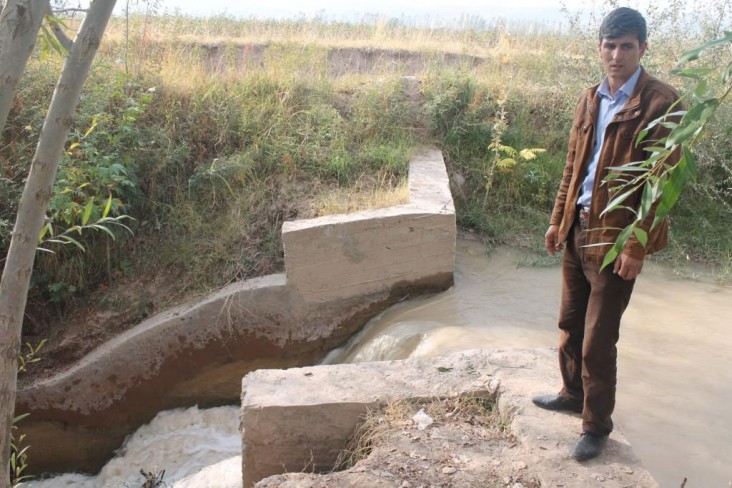
October 2015—Two main canals provide irrigation water for 21 villages in Dahana subdistrict, a rural municipality in Kulob in southern Tajikistan. For years, farmers could not reliably access water from the canal, and the government water authority lacked capacity and resources to improve the system.
To access water, farmers built temporary weirs (dams to alter water flow) with bags of soil and branches that constantly eroded and led to disputes between farmers. Without reliable irrigation water, farmers were limited to producing one harvest per year.
In November 2011, the USAID Family Farming Program helped Dahana farmers to organize a community water users association (WUA) to manage irrigation water delivery and infrastructure improvements. In order to create local ownership of the association, USAID emphasized community participation at all stages of development. For example, USAID trained farmers in key organizational skills and provided them with grants so they could rebuild canals.
By 2012, the Obi Shirin-D (“Sweet Waters”) WUA built an office headquarters, installed three concrete weirs, and repaired 31 water control gates. As a result, 19 villages gained reliable, improved access to irrigation water.
The association progressed significantly toward full sustainability through these achievements. Community members recognized the effectiveness of the WUA, and membership fees for its services increased 60 percent from 2013 to 2014.
“Before, there were no weirs in canals and farmers had problems getting water. Now there is a community organization that brings farmers together to solve water issues,” said Miraliyev Fayzali, manager of the Obi Shirin-D WUA.
Other donor sources also recognized Obi Shirin-D’s capacity to manage outside sources of funds. In 2013, the World Bank awarded the WUA a grant to clean nine kilometers of canals and install three water gates and valves. The association received an additional grant for an excavator and more infrastructure repair, and was assessed as one of the administratively strongest organizations in the region by the Bank.
With sustainable, diversified funding sources, Obi Shirin-D is now able to maintain canals and provide farmers with a predictable water supply, which will enable them to grow two crops per year, increasing production of vegetables that will increase household dietary diversity and income.
The Family Farming Program, part of the U.S. Government’s global hunger and food security initiative, Feed the Future, is designed to reduce poverty through improved nutrition and agricultural growth in 12 target districts in Tajikistan’s Khatlon province. The program runs from 2010 to 2015.
LINKS
Follow @USAIDCtrAsia, on Facebook, on Flickr, on YouTube







Comment
Make a general inquiry or suggest an improvement.